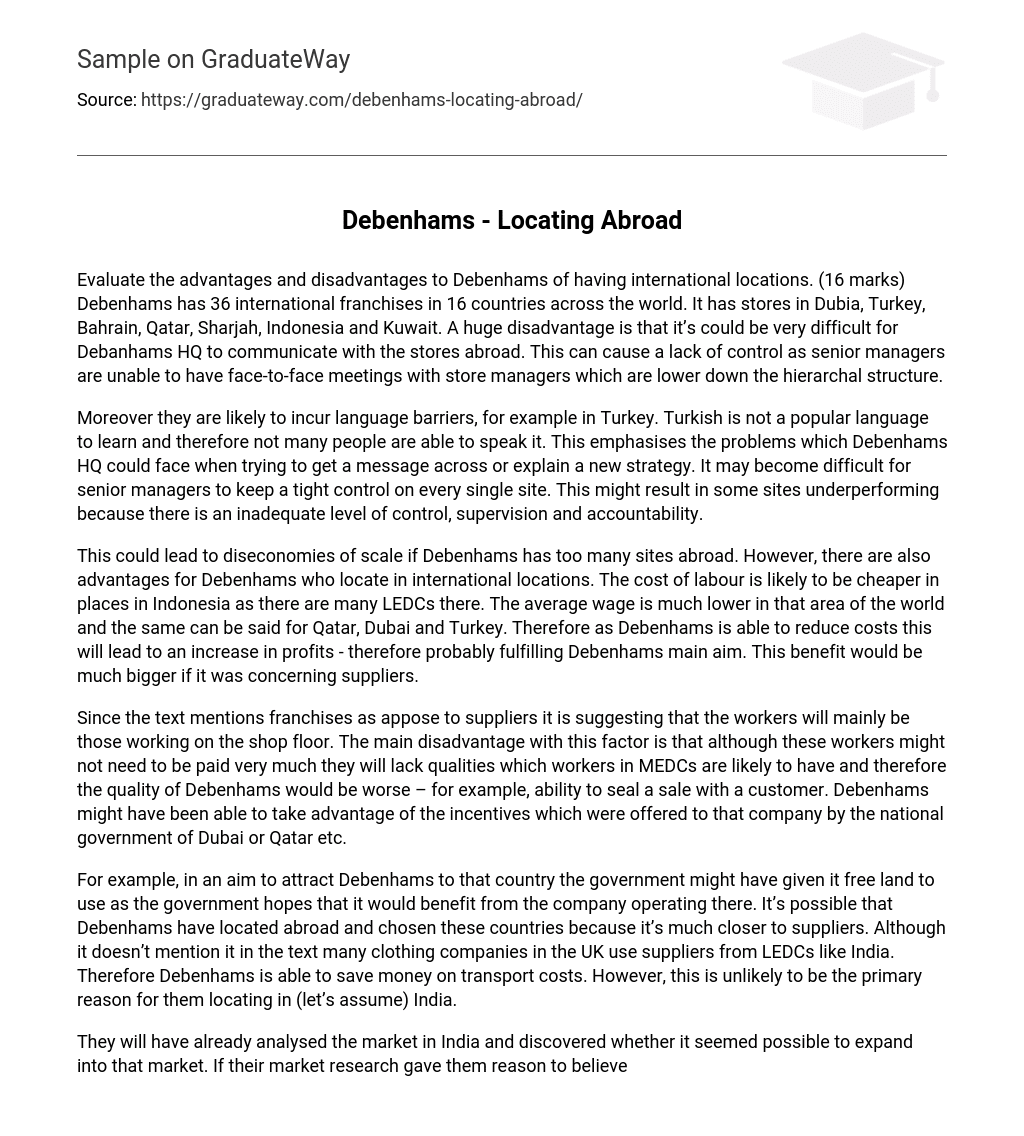Evaluate the advantages and disadvantages to Debenhams of having international locations. (16 marks) Debenhams has 36 international franchises in 16 countries across the world. It has stores in Dubia, Turkey, Bahrain, Qatar, Sharjah, Indonesia and Kuwait. A huge disadvantage is that it’s could be very difficult for Debanhams HQ to communicate with the stores abroad. This can cause a lack of control as senior managers are unable to have face-to-face meetings with store managers which are lower down the hierarchal structure.
Moreover they are likely to incur language barriers, for example in Turkey. Turkish is not a popular language to learn and therefore not many people are able to speak it. This emphasises the problems which Debenhams HQ could face when trying to get a message across or explain a new strategy. It may become difficult for senior managers to keep a tight control on every single site. This might result in some sites underperforming because there is an inadequate level of control, supervision and accountability.
This could lead to diseconomies of scale if Debenhams has too many sites abroad. However, there are also advantages for Debenhams who locate in international locations. The cost of labour is likely to be cheaper in places in Indonesia as there are many LEDCs there. The average wage is much lower in that area of the world and the same can be said for Qatar, Dubai and Turkey. Therefore as Debenhams is able to reduce costs this will lead to an increase in profits – therefore probably fulfilling Debenhams main aim. This benefit would be much bigger if it was concerning suppliers.
Since the text mentions franchises as appose to suppliers it is suggesting that the workers will mainly be those working on the shop floor. The main disadvantage with this factor is that although these workers might not need to be paid very much they will lack qualities which workers in MEDCs are likely to have and therefore the quality of Debenhams would be worse – for example, ability to seal a sale with a customer. Debenhams might have been able to take advantage of the incentives which were offered to that company by the national government of Dubai or Qatar etc.
For example, in an aim to attract Debenhams to that country the government might have given it free land to use as the government hopes that it would benefit from the company operating there. It’s possible that Debenhams have located abroad and chosen these countries because it’s much closer to suppliers. Although it doesn’t mention it in the text many clothing companies in the UK use suppliers from LEDCs like India. Therefore Debenhams is able to save money on transport costs. However, this is unlikely to be the primary reason for them locating in (let’s assume) India.
They will have already analysed the market in India and discovered whether it seemed possible to expand into that market. If their market research gave them reason to believe it was a worthwhile expansion then this factor would have simply reduced the risk, as costs are reduced. The countries mentioned might have political instability. This causes companies like Debenhams to locate in these countries due to the nature of the political regimes. (E. G – linked to low labour costs – it might be legal in these countries for workers to work very long hours for a low wage.
Moreover the age in which children can start work could be very low and Debenhams might have chosen to take advantage of this. ) However, this can give a bad image to the company and locating in these countries which have a poor record on human rights, could attract consumer boycotts or shareholder disapproved. The final advantage is that Debenhams have expanded its operations all around the world which opens up more markets as an aim to increase profits. However, although the markets are open and Debenhams are operating in them it doesn’t necessarily mean it will be a success.
For example, there might be bigger competitors over there which are hard to outcompete as they might have secured customer loyalty with the people living in the host country. Moreover, it’s not clear whether there is actually a gap in the market for Debenhams. Having said this, due to the size and success of Debenhams, it could be assumed that there would be strong reasons for Debenhams to choose this expansion and would have conducting some in depth research previously. It’s difficult to analyse whether the advantages outweigh the disadvantages because of the affects which can arise after Debenhams have set up.
Although there are obvious quantative advantages which are key like cheap labour but operating in these countries could affect the image of the business. It’s had a strong reputation (quality design and good customer service) since it was set up. Debenhams would not want to harm their image and reflect badly to their shareholders. If Debenhams are able to find the right balance and find both quantitative and qualitative factors then it should be able to gain an advantage over competitors and will be successful abroad. However, as qualitative factors are very difficult to measure, a true representation of the advantages might not be shown.





